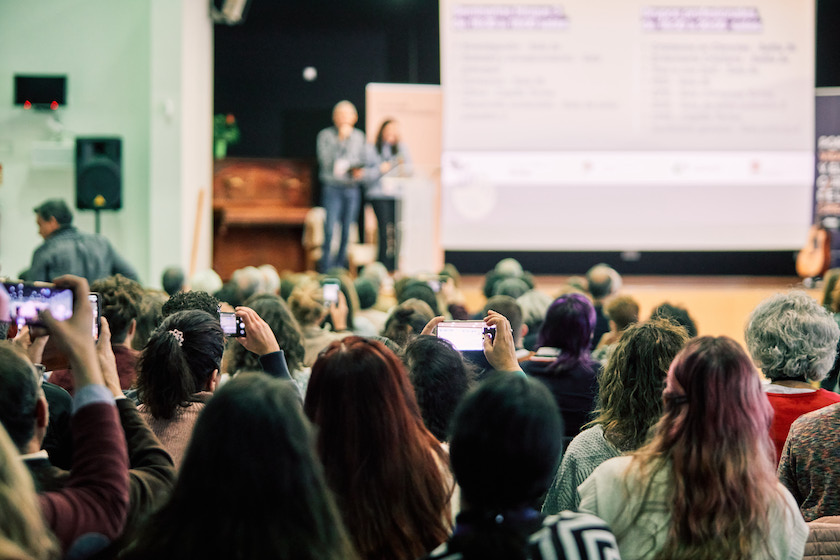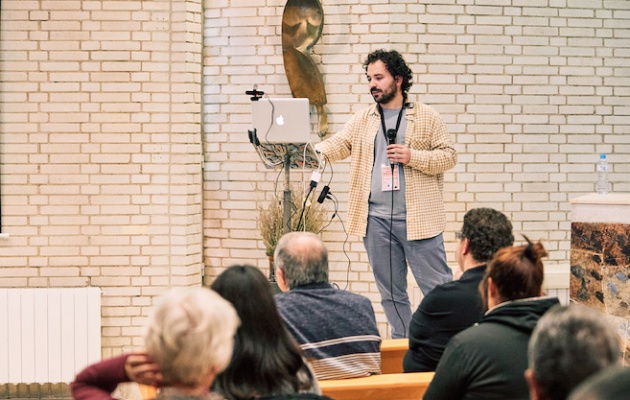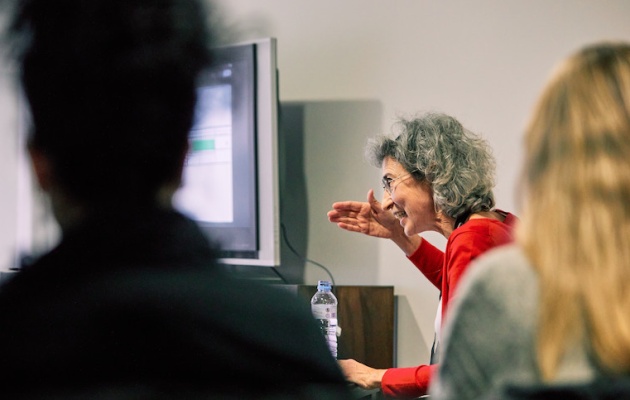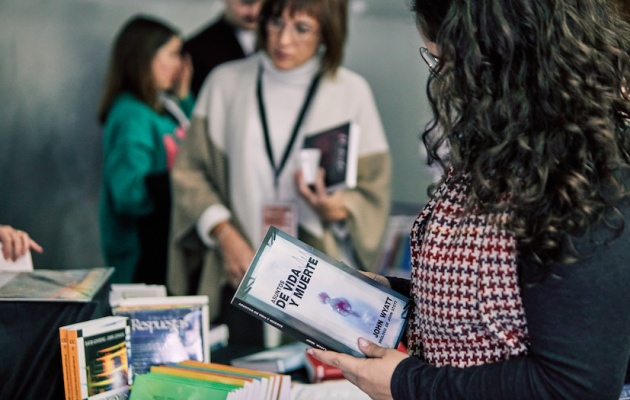Around 280 professionals, students, and church leaders attended the once-in-a-decade conference. Dr John Wyatt was the main speaker of a programme that included 15 other thematic seminaries.
![Professor John Wyatt, speaking at one of the plenary sessions of the Spanish Jornadas de Bióetica, in Madrid, 3-5 December 2022. / Photo: [link]Jornadas de Bioética[/link].](https://cms.evangelicalfocus.com/upload/imagenes/639716d7b3223_bioetc1Cropped(1).jpg) Professor John Wyatt, speaking at one of the plenary sessions of the Spanish Jornadas de Bióetica, in Madrid, 3-5 December 2022. / Photo: [link]Jornadas de Bioética[/link].
Professor John Wyatt, speaking at one of the plenary sessions of the Spanish Jornadas de Bióetica, in Madrid, 3-5 December 2022. / Photo: [link]Jornadas de Bioética[/link].
Eleven years ago, the third Bioethics Conference of evangelical Christians in Spain addressed issues that were of great interest at the time: human dignity, abortion, euthanasia, genetics, care for the most vulnerable... Only a decade later those issues are not only still present, but concern for them has permeated even more layers of society.
Among the more than 280 participants of the fourth Jornadas de Bioética (Bioethics conferece) in Alpedrete (near Madrid) between 3-5 December, were both young university graduates and experienced professionals. Many attending the gathering interact with these realities on a daily basis.
“This conference will be a lighthouse in the area of bioethics which will help Christian churches in the real and practical issues we our facing today”, said at the end of the conference Pedro Tarquis, a retired medical doctor and executive director of Evangelical Focus. “There was an unanimity in the feeling that we live in very special and challenging times. As a church, we are lagging, we must not allow all these issues to completely overflow us”.

[photo_footer] Attendants at a Bible exposition during the 2022 bioethics conference in Spain. / Photo: Jornadas de Bioética. [/photo_footer] The main speaker at the conference was John Wyatt, Emeritus Professor of Neonatal Paediatrics at University College London. Prior to travelling to Spain, he summarised some key issues in this interview.
“As technology advances, we are confronted again and again with the question: what does it mean to be human? And what answer should we give not just for ourselves but thinking about the world we leave to those who come after us?”, Wyatt said in Madrid. (note: the quotes from John Wyatt in this article have been translated from articles published in Spanish language)
For the bioethics expert, technology gives “capabilities but not answers. Technology tells us what is possible, but not what is right or wrong. We need other sources to provide us with purpose, direction, future and meaning”.

[photo_footer] A seminary on genetics, during the 2022 bioethics conference in Spain. / Photo: Jornadas de Bioética. [/photo_footer]
Euthanasia in Spain is available to people who have the capacity to ask for it because they are terminally ill or in a situation of intense suffering. “The problem lies in the vagueness of these terms”, analysed Wyatt, “which makes it a very subjective decision. As has happened in other countries, you start with a small number of cases, but they increase year by year”, the English medical doctor, citing the example of the Netherlands. There, a high percentage of cases result in organ transplants. “I see a strong narrative threatening the future: will suicide be promoted as something that ends up helping others through organ donation? This narrative, this understanding of ‘act of love’ is dangerous”.
The speaker said a challenge for many Christians, both medical and pastoral, is how to help people who feel they are a burden, or who say they want to die as an act of compassion for others. Wyatt encouraged to work to alleviate suffering, but never to understand it as something that detracts from the dignity of the person, “which is guaranteed because we are made in the image of God”.
He went on, “suffering is not a question that requires an answer, it is not a problem that requires a solution. It is a mystery that requires a presence. Thus, weakness is not condemned in the Christian worldview, but is where ‘the power, glory and beauty of God is revealed’”.
It is because of this truth that dependence “does not make us unworthy, but is part of the human essence”. Wyatt recalled that every human being is part of “the big family” that is humanity. “Every person is genetically connected to every other person in human history: we are all distant relatives”, so “every person deserves to be treated with respect. And calling ourselves family leads us to share burdens”. Wyatt noted: “When someone says to you, ‘I don’t want to be a burden’, you should say, ‘You're wrong, God designed you to be a burden to me and me to be a burden to you’”.
Based on these principles, Wyatt concludes that “we are called to protect life from embryo to natural death”.
The bioethics conference had a clear Christian perspective on the issues presented, and this meant there was time for Bible expositions. Evangelical pastor and head of the Theology Group of the Spanish Evangelical Alliance, José Moreno Berrocal, was in charge of the preaching Due to illness, he was unable to be present, so his interventions were projected on video.
Another of the speakers, Pablo Martínez Vila, also apologised for his absence because of several surgeries he had undergone recently. “This is the first time I have been unable to attend this conference”, said the psychiatrist from Barcelona in a latter that was read at the conference. “It has been hard to cancel my presence, for me it is something important in our country. In these days of illness, I have meditated a lot on John 1:4: ‘In him was life, and the life was the light of men’. My life is inseparable from the light of Christ. This is where all bioethics emanates from”.
José Moreno affirmed that the dignity of the human being, which is included in the Universal Declaration of Human Rights, has a clear biblical and Protestant heritage. “Respecting the dignity of the human being is not simply a matter of charity or condescension, but a divine requirement”. Citing Psalm 8, Moreno said that “crowned with glory and honour” alludes to a “position that God has given to humanity”, a position “spoiled by sin” but which is recovered “in Christ”.

[photo_footer] A seminary on naprotechnoloy, during the 2022 bioethics conference in Spain. / Photo: Jornadas de Bioética. [/photo_footer]
The Guest speaker, Dr Wyatt, was grateful that the organisers brought together in the same event the conversation around human care and the responsibility to care for our planet, despite these issues often being intoxicated by the political debates.
Other experts addressed creation care in the afternoon seminars. Miguel Wickham, a populariser and expert on climate change, pointed out some of the key issues. “The Word of God encourages us to react to what could be a real collapse”, he said.
Physicist and populariser Antoine Bret presented figures showing the already irreversible damage and that, in the most serious scientific forecasts, the risk of collapse is real. “The best metaphor I have found is to ask ourselves to behave well on the deck of the Titanic: we know that we are facing difficult times, but that does not mean that we should stop doing good”.
But what is the motivation when there seems to be no solution? Antoine Bret explained that, for him, the decision to respond to the environmental crisis comes from out of love for God. John Wyatt developed this point further by examining what he called “the grand biblical narrative”.
In the face of fatalism or techno-optimism, the Christian alternative is engagement with creation. “The materialist scientific narrative sees creation as impersonal, a play between matter and energy. But in the biblical narrative, creation is a product of the overflowing love of the Trinity and is therefore personal. All creation is about love”, Wyatt explained.
He traced the story of the Bible along the central thread of a God who by his glory has created man and the universe. That man is related to creation by being created from the same material. Redemption shows God’s ultimate commitment to his creation. And the resurrection presents the final restoration plan to which the end of history is directed.
Therefore, “we must repent for our failure to care for and protect the world God created”, he said. “We must find ways to connect biblical concerns with practical, realistic action. We need to recover our capacity for wonder at the natural world, which nurtures and renews our worship”.
The bioethics conference also devoted a specific seminar to the transgender challenge. British doctor Peter Saunders intervened via video call to offer data and statistics, looking in depth at the way in which Christians can respond to a trend that is clearly affecting our society today.
Saunders made a clear distinction between gender dysphoria - a medical problem that needs attention, help and compassion - and the queer-trans philosophy that calls for everyone to “be who they want to be” while ignoring biology. In response, Saunders encouraged those present to be courageous, to confront this issue with the truth in love, and to seek allies to prevent the development of laws that uncritically push this trend.
The wealth of materials generated during the conference - biblical expositions, seminars and plenaries - will be made available in various formats in the coming weeks.
On Monday, the last day of the conference, the organising committee met to write the conclusions of the conference, a short document which would try to give a specific response to many of the questions raised at the gathering. The hope is that these documents serve as a reference for evangelicals and for society as a whole.

[photo_footer] A range of books on bioethics was available at the conference. / Photo: Jornadas de Bioética. [/photo_footer]
Many participants expressed their joy at attending a meeting that dealt with topics that are not so common in the Christian sphere, and yet need to be approached seriously and calmly. In the discussions and question times, one could perceive this eagerness to seek an adequate response, but also to recognise the limitations. "Some issues are complex and nuanced, not everything is black and white", said John Wyatt at the end of his last presentation.
[analysis][title]Political representatives attended [/title][photo] 
[/photo][text]Parliamentary representatives of three political parties (rightists Vox, social democrats PSOE and conservatives PP) attended the opening night. They all praised the willingness of evangelical Christians to respond to critical issues in society.
Additionally, Manuel Martínez-Sellés, president of the Madrid College of Doctors (ICOMEM), expressed his disappointment at the pressures doctors are receiving as a result of the approval of laws such as those on euthanasia and abortion. “We are living through difficult times, when you have to be brave, because we have laws that contravene the ethics and morals that many of us have. We are concerned that the right to conscientious objection could be limited”.
The chair of the organising committee (formed by representatives of the Spanish Evangelical Alliance, the Graduates Bible Groups, and the Evangelical Council of Madrid) Rosa López Posteguillo, said: “I hope that these days will be a sowing that will bear good fruit in individuals, the family and society as a whole, and that it will bring to fulfilment, as the Genesis account says, that men and women are created in the image and likeness of God”.
[/text][/analysis]Learn more about the Jornadas de Bióetica by visting the conference's official website (in Spanish).
[donate]

Las opiniones vertidas por nuestros colaboradores se realizan a nivel personal, pudiendo coincidir o no con la postura de la dirección de Protestante Digital.
Si quieres comentar o